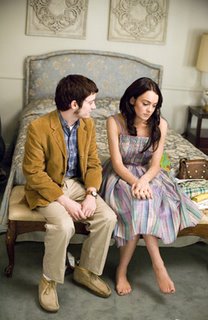Bobby

The title character of Bobby appears fleetingly, in news clips, and from the back as he is ushered into the Ambassador Hotel, and then into the hotel's kitchen after his victory speech after the 1968 California primary. But his spirit leaves fingerprints all over this film, written and directed by Emilio Estevez, who clearly clings to a romantic notion that Senator Robert F. Kennedy, were he not killed, would have been elected and led the United States on a better path.
Not a bad notion, and when we do see those news clips, or hear his speeches, it's easy to get caught up in nostalgia. But to support this notion, Estevez has made a clumsy, amateurish film. It is an homage to Grand Hotel (Estevez even has the audacity to have one of his characters quote that film early on). Several different characters, employees or guests of the hotel the night of Kennedy's victory speech and then assassination, meander through the film. Some of the stories resonate, some are merely window-dressing. A busboy is forced to work a double shift, even though he has tickets for the Dodger game that night. A young woman is marrying a soldier to make sure he doesn't go to Vietnam. The general manager of the hotel is fooling around with a switchboard operator, his hair stylist wife unknowing. A boozy chanteuse is performing at the Cocoanut Grove, while her handler husband struggles to keep her sober. Two young Kennedy volunteers score some acid.
Each of these threads is pretty insignificant, and don't really add to much of a tapestry, either. Mostly it's because of the script, which is something you might hear in a college creating writing class. Early on I was checking my watch, wondering how many more important speeches I would have to hear these characters make. The worst was probably by Laurence Fishburne, as the hotel's sagacious chef. When the busboy does him a good deed, he scrawls "Once and Future King" on the wall of the kitchen, and tells him about King Arthur. Hello, awkward Camelot reference! The acid trip scene was also an unintentional hoot, with Ashton Kutcher as the most stereotypical hippie you've ever seen.
A few things work--Anthony Hopkins is good as a retired doorman who still spends all of his time at the hotel, thinking about the old days, and Sharon Stone, as the cuckolded stylist, brings a nice dignity to her role. And just when I was ready to relegate this film to my worst list, it was almost saved by the last ten minutes--the assassination, in which all the characters converge, while a Kennedy speech about violence plays on the soundtrack. To anyone who harbors romance about the Kennedys, this is very moving.
What this film really is is a disaster movie, liked the old Ronald Neame films of the 70s. We are introduced to characters who are all strangers to each other, learn a bit about them, and then watch as they are united in tragedy. Unlike those films, though, there is no third act of a struggle for survival. The film stops and lets us the audience carry on that struggle. Unfortunately, this film isn't strong enough to get us there.


Comments
Post a Comment